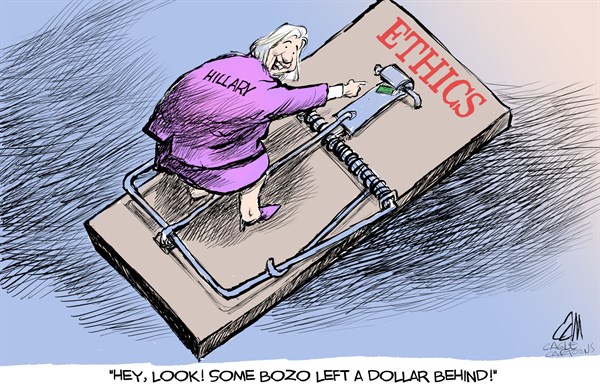by Troy Senik • Orange County Register

The most disturbing aspect of the scandal around Hillary Clinton’s use of a private e-mail server during her tenure as secretary of state is not the former first lady’s penchant for secrecy. In fact, we all ought to be a little taken aback that Mrs. Clinton’s poll numbers are declining as a result of that storyline. It boggles the mind to imagine that, after a quarter-century, there’s a slice of the electorate just now coming to the realization that she is not a terribly forthcoming politician.
What’s truly unsettling is that it has been widely taken as read among both the media and the general public that Mrs. Clinton will likely avoid serious legal consequences for her behavior because the Justice Department is ultimately answerable to President Obama – and Democrats will not use the instruments of government to destroy one of their own. Whether that eventually proves true, the sentiment itself reveals a troubling trend in American politics.
While it’s far from unheard of for public officials to apply less-exacting standards to their partisan allies, it’s unnerving that the segments of society charged with keeping those officials in check – namely, the media and the voters – now regard such lack of principle as so unremarkable that it barely merits mention. We have transformed into a country in which it’s difficult to imagine precisely what kind of official malfeasance would be met with more than a shrug of the shoulders.
While this trend has been at work for decades – you can thank both Richard Nixon and Bill Clinton for hastening the decline – it has reached escape velocity during the Obama years. The Justice Department, for example, already took a pass on prosecuting Lois Lerner, the IRS official at the center of the scandal in which conservative groups were singled out for special scrutiny by the federal government on the basis of their political beliefs. If there’s anything that ought to be a matter of consensus in American politics, it’s that holding the reins of power doesn’t give you carte blanche to turn the power of the state against your partisan rivals. Yet Ms. Lerner, having done that very thing, doesn’t seem to be much worse for the wear.
This hands-off trend isn’t limited by any means to the DOJ. Consider the current debate over the nuclear deal with Iran. By any reasonable reading, the agreement should have been presented to Congress as a treaty, requiring a two-thirds supermajority in the Senate to take effect. The White House, however, has refused to classify it as such, leaving Congress to haggle its way into an arrangement whereby the president can have his way with the support of just one-third of either house of Congress.
The Obama administration hasn’t even attempted to dress this up as a matter of principle, with Secretary of State John Kerry telling the House Foreign Affairs Committee last month that the deal wasn’t a treaty simply “because you can’t pass a treaty anymore.”
That’s the organizing precept of this era in American politics: The rules apply until they put those in power at a disadvantage. Because we’ve arrived at this point incrementally, perhaps we’re not conscious of how sweeping the transformation is. So let’s be clear about what’s at stake: This is a wholesale abandonment of the foundational American principle of the rule of law.
There are only two options available here: Either the country returns to a form of government bound by the strictures of the Constitution and its subordinate laws or we give up the ghost and accept the fact that our politics are now entirely about power rather than principle – that we live in a nation where the president, whether his name is Obama or Trump, is limited only by the boundaries of imagination.
There are a lot of ways to describe that form of government. “Constitutional republic” isn’t one of them.